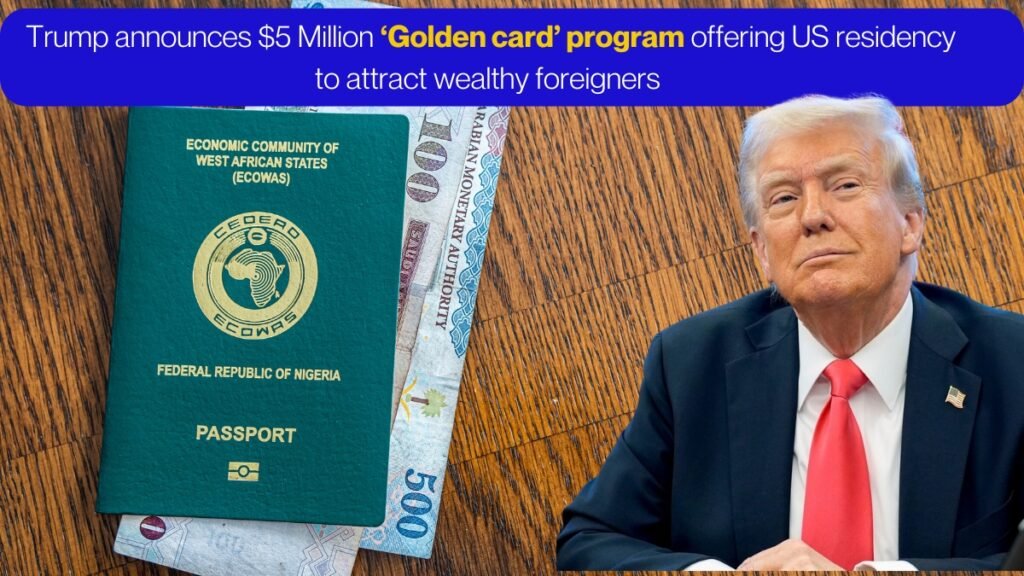In a surprising and controversial move, former President Donald Trump has announced a new immigration initiative titled the ‘Golden Card’ program. This initiative, which aims to grant U.S. citizenship to wealthy foreign investors in exchange for a $5 million investment in the American economy, has sparked debates among policymakers, economists, and immigration experts.
Overview of the ‘Golden Card’ Program
The Golden Card program is an expansion of the existing EB-5 Immigrant Investor Program, which already allows foreign nationals to obtain green cards through investment. Under Trump’s new plan, the financial threshold is raised significantly to $5 million, promising accelerated pathways to U.S. citizenship for those who meet the requirements.
Key Features of the Program
- Investment Requirement: Eligible applicants must invest a minimum of $5 million into U.S. businesses, real estate, or infrastructure projects.
- Fast-Track Citizenship: Unlike the traditional EB-5 visa, which grants a green card first, the Golden Card would provide a direct pathway to citizenship within a shorter time frame.
- Job Creation: Investments must create at least 15 full-time jobs for American workers, compared to the EB-5 requirement of 10 jobs.
- No Sponsorship Needed: Unlike other visa categories, no employer or family sponsorship is required.
- Residency Flexibility: Holders of the Golden Card can live and work anywhere in the U.S. without restrictions.
Trump’s Justification for the Golden Card
In his announcement speech, Trump stated that this initiative aims to “boost the American economy by attracting the world’s wealthiest investors.” He emphasized that the $5 million investment threshold ensures that only those with significant economic resources and business acumen can qualify. According to Trump, the program will:
- Increase job opportunities for American citizens.
- Stimulate economic growth in key industries such as technology, real estate, and manufacturing.
- Reduce reliance on lower-skilled immigrant labor by focusing on high-net-worth individuals.
Economic and Political Reactions
The announcement has received mixed reactions from different sectors:
Supporters’ Arguments
- Economic Growth: Proponents argue that attracting wealthy investors will bring billions of dollars into the U.S. economy, creating jobs and fostering innovation.
- Reduced Burden on Social Services: Unlike other immigration programs, the Golden Card targets high-income individuals who are unlikely to rely on government welfare.
- Competitive Edge: The U.S. will join countries like Portugal, Canada, and the UK, which already offer similar investment-based citizenship programs.
Critics’ Concerns
- Inequality in Immigration: Many argue that this program prioritizes wealth over merit and skills, favoring the ultra-rich over skilled professionals or refugees.
- National Security Risks: Some experts warn that fast-tracking citizenship for wealthy individuals could open doors to money laundering or foreign influence in U.S. affairs.
- Undermining Traditional Immigration Paths: Critics claim that this could make it harder for middle-class immigrants to obtain U.S. residency through existing legal pathways.
Comparison to the EB-5 Program
| Feature | EB-5 Visa Program | Trump’s Golden Card |
|---|---|---|
| Minimum Investment | $800,000 (TEA) / $1.05M (Standard) | $5 Million |
| Path to Citizenship | Requires 5+ years as a green card holder | Direct, faster route |
| Job Creation Requirement | 10 jobs | 15 jobs |
| Government Oversight | Strict scrutiny | Likely increased due to fast-tracking |
| Target Investors | Mid-to-high net worth individuals | Ultra-high-net-worth individuals |
Legal and Policy Hurdles
Despite Trump’s bold announcement, the Golden Card program faces several legal and policy challenges before it can be implemented. Immigration laws in the U.S. require congressional approval for significant changes to citizenship pathways. Some legal experts argue that the fast-tracking of citizenship may violate existing naturalization policies, which typically require a minimum residency period and thorough background checks.
Additionally, opposition from Congress and immigration advocacy groups could delay or block the program. Democratic lawmakers are expected to challenge the policy, citing concerns about fairness and ethical implications.
Impact on Future U.S. Immigration Policies
If implemented, the Golden Card program could set a precedent for wealth-based immigration policies in the U.S. It may lead to further changes, including:
- Higher investment thresholds for existing investor visa programs.
- Increased competition for citizenship among ultra-wealthy individuals worldwide.
- Potential adjustments in employment-based immigration policies to balance opportunities for both wealthy investors and skilled workers.
Conclusion
Trump’s $5 million Golden Card initiative represents a radical shift in U.S. immigration policy, prioritizing financial investment as a pathway to citizenship. While its potential economic benefits are undeniable, ethical and legal concerns may hinder its implementation. As debates unfold, the future of U.S. immigration may see a significant transformation, shaping how citizenship is granted in the years to come.
The question remains: Will America’s future citizens be determined by merit, need, or financial power? Only time will tell whether Trump’s Golden Card becomes a reality or remains just another controversial proposal.


